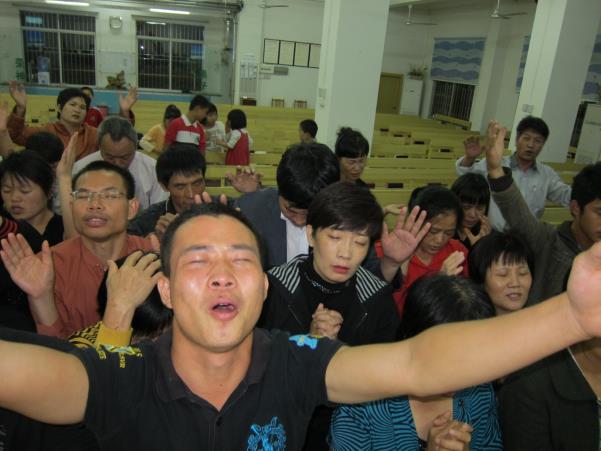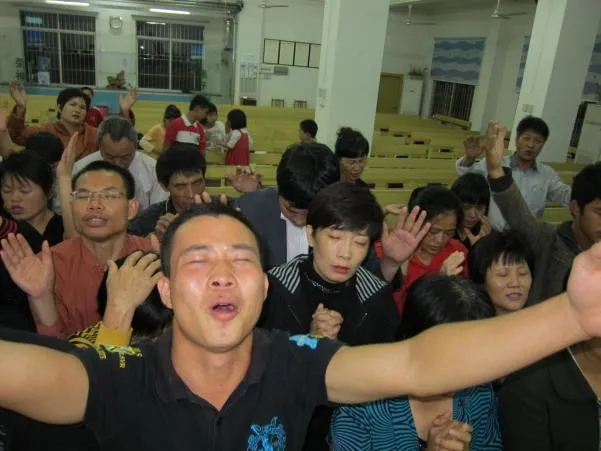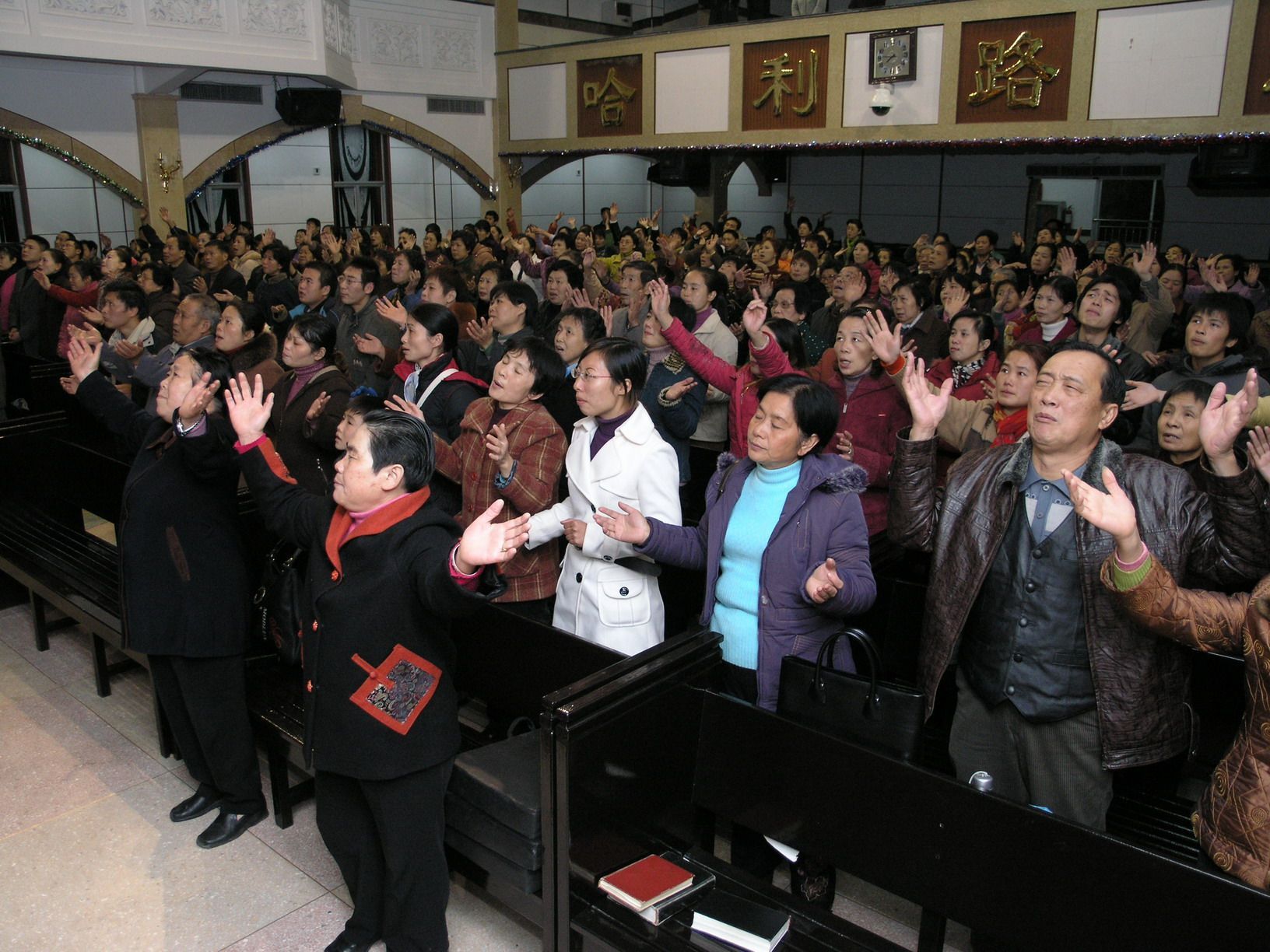
A contemporary Christian worship service at an urban church. [RCMI]
A Time of Consolidation
After more than 30 years of almost unhindered growth in Shandong, the house churches appeared to enter a new period in the 2010s. While evangelism still continued and many new people came to faith in Jesus Christ—especially in the rural areas of the province—the leaders of God's flock realized they also needed to concentrate on training in order to establish the millions of new believers in the faith.
Like countless other revivals throughout Church history, the Shandong churches entered a period of consolidation, where they focused more on retaining the gains made during the 1980s, '90s and 2000s. They realized it made no sense to win people to the Lord if there was no structure in place to keep them grounded in the faith.
Ironically, although the house churches in other parts of the country sometimes ridiculed the Shandong believers for their cautious and conservative ways, those traits that were considered weaknesses by outsiders proved to be great strengths. Because of their desire to keep heretical teaching and practices out of the Shandong churches, many pastors throughout the province had a solid base in their lives , enabling them to reach out and teach others how to handle the Scriptures correctly.
Although countless people continued to enter the kingdom of God, the Shandong revival showed signs it was beginning to slow down, especially in urban areas. As Chinese society lurched toward extreme consumerism, people's hearts were generally not as receptive to the gospel as in previous decades. It was not as though the fire was close to going out, however. Rather, instead of hundreds of thousands of people coming to faith each year in the house churches, now 'just' tens of thousands came.
The Continuing Famine of God's Word
The need for Bibles among China's house churches was acute in China in the 1980s and '90s, when thousands of Christians from around the globe traveled to Hong Kong and lovingly carried Bibles across the border into Mainland China. In the new millennium, however, many overseas believers were unaware that the need for Scriptures remained great in China, due to a variety of factors.
Although a certain number of Bibles were legally printed inside China each year by the government-approved Amity Press, those copies were only made available to members of the Three-Self Patriotic Movement. The house church networks, which constitute approximately two-thirds of Evangelical Christians in Shandong, have been left to pick up the crumbs that fall from the table of the registered church.
The house church leaders throughout the country are convinced that the government, in collusion with the Three-Self Church, is deliberately seeking to strangle the spiritual life out of the unregistered house church movements by strictly controlling the supply of Bibles. This is yet another form of persecution, and it has left the millions of house church believers in Shandong vulnerable to spiritual immaturity and exposed to dangerous cults.
Many Three-Self Church affiliated Christians, however, have shown smug disdain for the struggles of the house church believers. A prevailing thought of some registered believers is that the house churches should swallow their pride and register with the government. Many house churches, however, are adamant they will never submit to an entity controlled by atheists, and they continue to stand their ground, even if it means they are unable to access God's Word.
A small number of ministries helped the house churches print Bibles illegally inside China for a number of years, but the project carried great risk, and anyone caught printing or distributing an illegal Bible faced a minimum of three years in prison without trial. The need was so great, however, that many were willing to take that risk.
In the twenty-first century, Asia Harvest emerged as one ministry willing to go against the flow and print the Word of God for the Chinese house churches. At the time of this book going to print, Asia Harvest had printed and distributed 875,942 full Chinese Bibles for the house church believers in Shandong. In response, the ministry received many touching letters from thankful Shandong church leaders, which provide insights into the massive scale of the problem. One letter, received from a regional church leader in 2011, said,
"You may have heard about recent drought in our area and how we are unlikely to have a winter wheat crop because the drought is so severe. What the news doesn't report is the great spiritual harvest we are reaping, as every day many souls come to the Lord throughout our province. We are even seeing God work through the drought as many farmers are now willing to hear the gospel since they have lost confidence in their own abilities. Now they understand how precious it is when God sends rain on the land, and they have repented of their sins.
Because of the large number of new converts throughout Shandong, we currently need 589,812 Bibles just to provide one for each person in our fellowships. We ask God to pour out a special blessing on you for providing these precious Bibles to us." 1
In the following years, Asia Harvest received more letters from other Shandong house church leaders, revealing the serious challenges facing believers in the province. In 2012 one senior church leader wrote,
"The house churches throughout Shandong have experienced great growth in recent years. One of the side effects of this growth is that we struggle to get enough Bibles to meet the need of new believers. We cannot thank you enough for providing Bibles to us. Our fellowships are growing stronger in faith and knowledge as well as in number as a direct result of these precious gifts you provide. At this moment, we need 146,238 more Bibles so that each new believer will have their own copy. From the bottom of our hearts we say thank you and God bless you!" 2
In 2013 an evangelist from a rural area of Shandong wrote,
"When the gospel was first shared with us last December, we did not have any Bibles among us. We felt such a hunger to know more about the Truth that we had been searching for all our lives. The evangelist who preached to us did not have an extra Bible either, and he attempted to obtain Bibles for us that winter without success. When we cried out to the Lord with a burning desire to know Him, we received a peace in our hearts that our Heavenly Father was going to provide, but we did not understand how. In May 2013 the Lord answered our prayers and every fellowship leader and evangelist among us received a Bible. We fell down on our faces before the Lord and wept with joy as we thanked Him for providing the Bread of Life.
The people who brought the Bibles to us explained that they are provided by Christians around the world who care for us and who sacrificed their hard-earned money so we could have God's Word. We are just peasants from the countryside, so we don't understand much about the world outside of China. Everything overseas seems so strange to us; but we now feel this strong connection to God's people around the world even though we haven't met them yet.
Now the Lord has given us a desire to tithe from our vegetables, rice, wheat, chickens and eggs that we take to the city market. We will use the proceeds to help provide the Scriptures to other Christians in China who do not yet have any. This is our way of passing on the most wonderful gift we have received in our lives. Although we don't know you by name, we thank you from the depths of our hearts for providing these Bibles to us. We believe that in heaven the Lord is going to reveal those of you who provided the Word of God. We look forward to worshiping before the Lord with you! God's grace and peace be with you until then." 3
As as this book was being prepared for publication, two more letters were received from Shandong. The first emphasized the urgency of the situation in the province:
“Thank you for the Bibles you delivered to us recently. These have been distributed and were received with many thanks to the Lord. They are the answer to our prayers. Although it's sometimes possible for believers in big cities to buy a Bible from the Three-Self church, our believers in farming areas have no such access, and most are so poor that they could never afford the price of a Bible even if they were able to obtain one. Please send more.”
The second was written by a church elder in late 2016,
"I first heard the gospel from a traveling evangelist many years ago. He was very sorry that he couldn't leave a Bible with us. He only had one personal copy. It was many years before I saw a Bible and heard the gospel again; but the message shared with me at that time had a huge impact and I often thought about it over the years. After much searching I repented of my sinful ways and now I serve the One True God.
In 2007 I received a Bible through your ministry. It consumed me and I read it many hours each day as I sought to know God’s plan for my life. Nine years have passed, and now I am involved in helping to get Bibles to new believers in rural districts. It is such an honor and pleasure to serve God's children this way. I get to witness their tears of joy and gratitude when they hold God's Word for the first time." 4
Jesus in the Boardroom
With China's growing wealth and emergence as a world power, in recent years a breed of Christians surfaced in Shandong that would have been almost impossible for previous generations of believers to imagine. Many wealthy business owners—some running billion dollar companies— have risen to prominence in the 'new China'. The difference with some of these men and women, however, is that they are committed followers of Jesus Christ, and they see their companies as a vehicle provided by God for spreading the gospel.
One such Christian businessman is Wang Ruoxiong, the founder and chairman of the huge Chinese real estate company, Tiantai Group. In 2015 the BBC examined this peculiar partnership between the corporate boardroom and Christianity. Wang made it clear where his company derived its motivation. The BBC reported,
"Saying prayers with colleagues would feel a bit uncomfortable; too intimate an activity in the workplace for many people. Yet at Chinese real estate giant Tiantai Group...that is exactly what they do in the boardroom before making important decisions.
Three-quarters of the firm's eight-strong senior management team are Christians and founder and chairman Wang Ruoxiong, who himself became a Christian seven years ago, says that when the company has to make difficult decisions, it turns to the Bible for guidance. In fact, he goes as far as to say that it's not him but God running the firm.
'He controls everything. I am merely a housekeeper of Jesus, assisting him in taking care of the company,' he says." 5
Calm before the Storm
The 2010s started relatively peacefully for the Church in Shandong and most other parts of China. Persecution appeared to be at its lowest ebb since the advent of Communism in 1949, and although believers faced new difficulties as materialism and the love of money rose up like a massive two-headed god. The Lord Jesus Christ, however, preserved a remnant of those who love Him with all their hearts, and the Shandong Church continued to grow every year, though not at the same rate as in previous decades.
Although persecution of Christians appeared to reduce in the first half of the 2010s, there were occasional reminders of the past. In January 2011, for example, the police raided a large Christian meeting of more than 1,000 people in Cangshan County in southern Shandong. Local Public Security officials burst into the church and forced the meeting to end, before they took the leaders into custody, including the speaker Lu Daihao, a well-known visiting evangelist from Taiwan.
In 2014 China shocked the world by announcing the closure of all prison labor camps—horrid places where tens of thousands of Christians were mercilessly tortured over the previous six decades.
The Status Quo Resumes
In 2016 the Chinese President, Xi Jinping, demanded to meet privately with several of China's senior house church leaders. Although the content of their discussions was kept strictly confidential, the results were soon clearly evident, as wave after wave of persecution against the house churches was launched throughout China.
In eastern Shandong's Qingdao City, the police visited a local house church leader and told him, "We know all about your various meetings. We have been instructed to close you down, but we will continue to let you meet if you give us all the weekly offerings you collect in your churches!" 6
The house church leader rejected their attempted extortion, and the church broke into numerous smaller groups, allowing them to meet discreetly and without disturbance from the corrupt local authorities.
In September 2016, when the government announced new religious restrictions aimed at curbing the growth of Christianity, it seemed the more tolerant attitude prevailing in China had come to an abrupt end. Throughout the nation house church leaders soon found themselves under tremendous pressure.
Many pastors and evangelists were arrested and interrogated, while others had their meetings shut down. Worse, some leaders went missing, having been bundled into vans or taken from their homes and sent to one of China's notorious secret 'black jails'—unofficial places where the government's perceived enemies are taken and tortured mercilessly. These jails are often located inside secure places like deserted junk yards or abandoned factories, where the wicked men and women of China's state security division feel free to do their worst to the children of God.
At the time of completing this book, one Shandong house church leader contacted us to say, "Things here are like in Mao's day! We never thought we would return to such a time. The younger generation of believers have never experienced severe persecution, and they are shaken. Please pray they will patiently endure, and their faith will be tested and found to be like pure gold." 7
Another letter from Shandong presented a sobering summary of the conditions in the province at the end of 2016:
"The new Communist leadership requires that all churches be controlled by the Communist Party. They must even display a national flag to show their loyalty. Some large churches have been asked to hand over the church offerings to the police. When the pastors refuse to do so, they are ordered by the police to disband their congregations. Some large house churches have been forced to restructure into many small cell groups. The crackdown has been spreading and there will be tough times ahead.
The government is once again trying to squeeze the life out of the Church. There are new laws prohibiting any religious activities without government approval—even holding Bible studies of more than ten people in homes. We need to conduct trainings with fewer participants.
One of our workers went so far as to say, 'China has closed…the door is closed'—at least temporarily. What she means is that ministries operating in China are limiting what they are doing and trying to lower their profile.
Apparently, the government is using a new method to deal with people when they arrest them. Instead of beating them, they are drugging them with a mind-altering chemical that diminishes the person's mental capacity. Ministry is still possible, but we need to move with extreme caution." 8
As you have read in the pages of this book, the history of the Church in Shandong has been blessed with powerful revivals, and from the ruins of ashes, floods, famines and wars arose a shining and pure Bride of Christ. The Living God, Jesus Christ, has gained much glory from His disciples in Shandong.
While the current Chinese rulers appear determined to repeat the mistakes of their predecessors by once again trying to hurt and destroy God's people, may we pray that the persecution will again result in revival and rapid growth in Shandong—the blessed Revival Province of China.
Footnotes:
1. Letter from a senior Shandong house church leader to Asia Harvest, 2011.
2. Letter from a senior Shandong house church leader to Asia Harvest, 2012.
3. Letter from an evangelist in Shandong to Asia Harvest, 2013.
4. Letters from Shandong house church leaders to Asia Harvest, 2016.
5. Katie Hope, "Firm Faith: The Company Bosses who Pray," BBC News ( July 6, 2015).
6. Personal communication with a Shandong house church leader, September 2016.
7. Personal communication from a Shandong house church leader, September 2016.
8. Personal communication from a Shandong house church leader, November 2016.

© This article is an extract from Paul Hattaway's book 'Shandong: The Revival Province'. You can order this or any of The China Chronicles books and e-books from our online bookstore.






